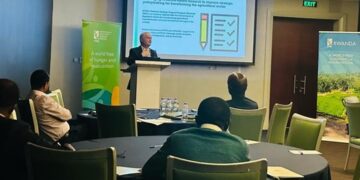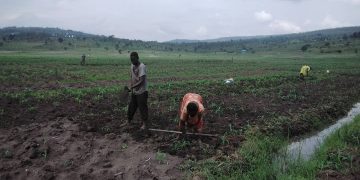On December 2, 2024, the International Food Policy Research Institute (IFPRI) - Rwanda Strategy Support Program in collaboration with the Ministry of Agriculture and Animal Resources (MINAGRI), hosted a high-level event at the Park-Inn Hotel in Kigali under the theme STRENGTHENING RWANDA’S FOOD SYSTEMS: RESEARCH-DRIVEN INSIGHTS FOR ENHANCED POLICY MAKING. This gathering of policymakers, researchers, […]
Reflections on the Price Dynamics for Agriculture and Nutrition Policy Workshop: Leveraging Stata and e-SOKO Market Price Data A learning event conducted by the International Food Policy Research Institute Nyamata, Rwanda | May 29-31, 2024
The recent workshop titled "Price Dynamics for Agriculture and Nutrition Policy: Advanced Analysis Using Stata to Explore and Utilize e-SOKO Market Price Data" organized by the International Food Policy Research Institute (IFPRI) in partnership with the Ministry of Agriculture & Animal Resources, was an important learning event for the development of using Rwanda’s e-Soko market […]
Agnes Kalibata explains that Rwanda managed to dramatically reduce poverty in Rwanda by focusing on the livelihoods of the poor, and points to the helpful evidence provided by IFPRI to support this effort.”
“Success has many parents:” Agnes Kalibata explains that Rwanda managed to reduce poverty in Rwanda over five years by focusing on the livelihoods of the poor and points to the helpful evidence provided by IFPRI to support this effort
Lessons learned from the Livestock Master Plan and future investment priorities for animal resources development
Under PSTA4, the Rwandan government has set several growth targets for the sector, including increasing milk production from 785 million liters in 2018 to 1.5 billion liters by 2024, and increasing the national herd size from 1.5 million to 2.5 million by 2024. To achieve these targets, the government developed the 15-year livestock sector strategy that identified promising interventions and policies, and a five-year Livestock Master Plan (LMP, FY 2017/2018 to 2021/2022) that set out an investment roadmap to modernize the sector in line with the National Transformation Strategy and PSTA4
The value of control versus the value of time: A field experiment in Rwanda
Agricultural development programs often aim to empower women by enhancing their control over income via new work opportunities, but as an unintended negative consequence, these programs can sometimes increase women's already heavy workloads. This raises the question of whether women themselves consider the increased control over income to be worth the additional work. To answer this, we need to know how much they value control over income and how much they value efforts to free up their time.
- 1
- 2
- 3
- …
- 9
- Next Page »




